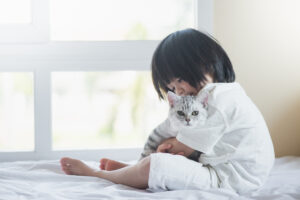How pets can teach kids life skills

Pet ownership is a chance to help little ones learn some of life’s biggest lessons in a gentle, rewarding way.
Most parents experience a time when their little one starts asking for a family pet. While this can feel like yet another thing to manage, there are actually some amazing benefits to pet ownership in terms of children’s development. So take some time to consider the positive effects of adopting a furry friend before you make a final decision.
Five life lessons
Admittedly, your little one probably isn’t asking for a dog or a cat to further their own development. If you do choose to grant this request, however, there are ways in which it can benefit everyone involved! Raising a pet offers a unique way to teach kids some of life’s most important lessons, such as empathy, duty, staying active and more.
Empathy
In short, empathy is the ability to understand and feel the emotions of another. Spending time with an animal can gently expose little ones to the ups and downs that we all experience in everyday life. If your dog is feeling a little sad or scared, your child will be able to learn that by cuddling and comforting them, they’re helping their canine buddy overcome these difficult feelings.
New research shows that dogs respond to unhappiness in the humans around them. They might even go as far as nuzzling up beside your child if they’re feeling glum, in an effort to cheer them up. Reciprocity in these moments can underline the effect of empathy for your little one. Developing empathy at a young age will stand to your child throughout their childhood, and beyond. In a way, empathy is almost like a super power, and it will allow them to forge deep connections with the people in their life.
Responsibility
For most young children, owning a pet will bring about their first sense of obligation. We can sometimes be too hesitant to give our little ones some responsibility out of fear that they will be overwhelmed. In doing that though, they might miss out on the upside. Minding the new pet, making sure they get fed or taking them for a walk are neat ways your child can practise being responsible for something. Yes, it’ll be a challenge at first but once they feel the satisfaction that comes afterwards, they’ll be more able to understand responsibility. Not shying away from their duties will ensure that your little one will be well set-up for whatever comes their way.
Self-esteem
As discussed, practising responsibility by taking care of a pet has many perks for children when it comes to how they interact with the external world. Similarly, it can provide a lift to their internal world – in the form of improved self-esteem. Looking after and loving a pet (and being loved back!) can help us all to feel better about ourselves. Acting in an independent manner by taking the dog for a walk will almost definitely have a positive effect on your child’s relationship with themselves.
Also, having another being, whether it be a person or an animal, rely on you for support is a self-esteem booster. For your little one, it’s a way for them to feel that they’re important and capable. A good level of self-esteem is so helpful for children trying to stand on their own two feet and navigate this complicated world.
Physical activity
Health-wise, exercise is essentially non-negotiable and finding new ways to fit this into your child’s life is always good. Through PE at school, and sports after school or at weekends, there are ample opportunities for little ones to stay active. However, not all kids excel in this arena and they may even develop a strong dislike for it. If your child is turning their back on sport for one reason or another, that doesn’t have to mean that they have to stop exercising. Taking the family dog for a walk or a play in the park is a wonderful, fun way for your child to get their sweat on without worrying about sport or athletics.
Patience
Today, we can get almost anything at the click of a button and that certainly has some drawbacks. For one, the desire for instant gratification is so prevalent among children and this will almost definitely present them with issues throughout life. In order to counteract this, it’s crucial to introduce elements of delayed gratification. Opportunities to encourage your little one to practise patience should not be missed. Teaching a pet new tricks or helping to house-train them will demand patience, and your little one will learn that good things take time. As they develop, they will be able to leverage this patience while working hard to achieve their goals!
Paws for thought!
It may seem sensible to reject your little one’s pleas for a new furry family member but there are numerous reasons to pause and consider this idea further. While not the only method to help your child develop these life skills, it’s a way to do so while bringing the lightness and joy that come along with the arrival of a new pet!
Image Credit: Shutterstock












Comments